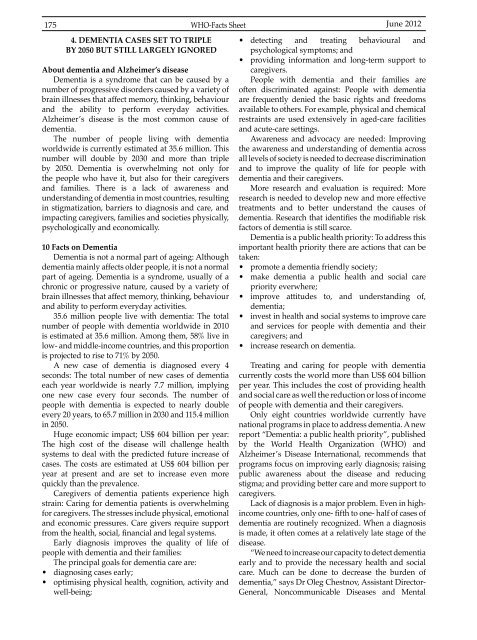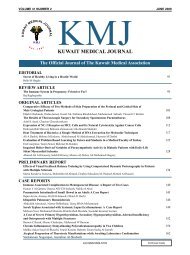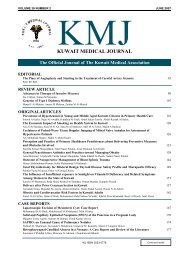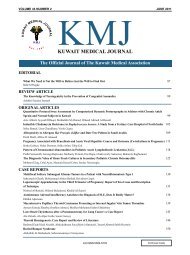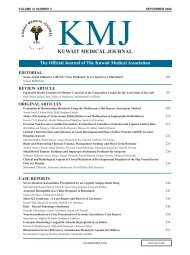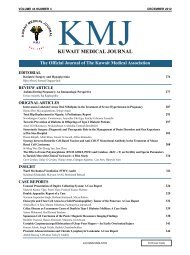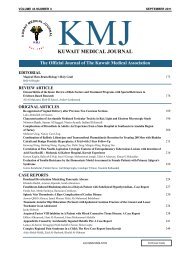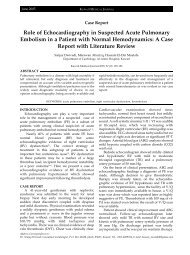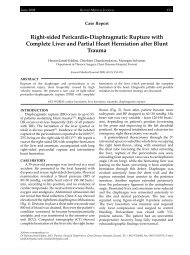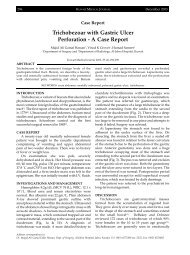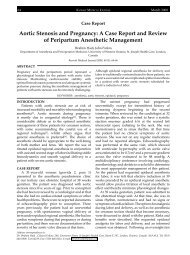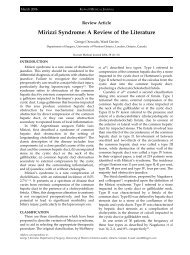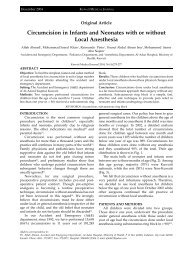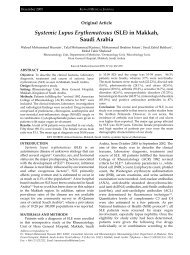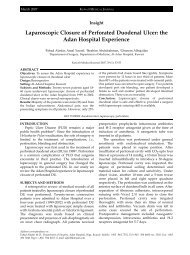Vol 44 # 2 June 2012 - Kma.org.kw
Vol 44 # 2 June 2012 - Kma.org.kw
Vol 44 # 2 June 2012 - Kma.org.kw
You also want an ePaper? Increase the reach of your titles
YUMPU automatically turns print PDFs into web optimized ePapers that Google loves.
175<br />
4. DEMENTIA CASES SET TO TRIPLE<br />
BY 2050 BUT STILL LARGELY IGNORED<br />
About dementia and Alzheimer’s disease<br />
Dementia is a syndrome that can be caused by a<br />
number of progressive disorders caused by a variety of<br />
brain illnesses that affect memory, thinking, behaviour<br />
and the ability to perform everyday activities.<br />
Alzheimer’s disease is the most common cause of<br />
dementia.<br />
The number of people living with dementia<br />
worldwide is currently estimated at 35.6 million. This<br />
number will double by 2030 and more than triple<br />
by 2050. Dementia is overwhelming not only for<br />
the people who have it, but also for their caregivers<br />
and families. There is a lack of awareness and<br />
understanding of dementia in most countries, resulting<br />
in stigmatization, barriers to diagnosis and care, and<br />
impacting caregivers, families and societies physically,<br />
psychologically and economically.<br />
10 Facts on Dementia<br />
Dementia is not a normal part of ageing: Although<br />
dementia mainly affects older people, it is not a normal<br />
part of ageing. Dementia is a syndrome, usually of a<br />
chronic or progressive nature, caused by a variety of<br />
brain illnesses that affect memory, thinking, behaviour<br />
and ability to perform everyday activities.<br />
35.6 million people live with dementia: The total<br />
number of people with dementia worldwide in 2010<br />
is estimated at 35.6 million. Among them, 58% live in<br />
low- and middle-income countries, and this proportion<br />
is projected to rise to 71% by 2050.<br />
A new case of dementia is diagnosed every 4<br />
seconds: The total number of new cases of dementia<br />
each year worldwide is nearly 7.7 million, implying<br />
one new case every four seconds. The number of<br />
people with dementia is expected to nearly double<br />
every 20 years, to 65.7 million in 2030 and 115.4 million<br />
in 2050.<br />
Huge economic impact; US$ 604 billion per year:<br />
The high cost of the disease will challenge health<br />
systems to deal with the predicted future increase of<br />
cases. The costs are estimated at US$ 604 billion per<br />
year at present and are set to increase even more<br />
quickly than the prevalence.<br />
Caregivers of dementia patients experience high<br />
strain: Caring for dementia patients is overwhelming<br />
for caregivers. The stresses include physical, emotional<br />
and economic pressures. Care givers require support<br />
from the health, social, financial and legal systems.<br />
Early diagnosis improves the quality of life of<br />
people with dementia and their families:<br />
The principal goals for dementia care are:<br />
• diagnosing cases early;<br />
• optimising physical health, cognition, activity and<br />
well-being;<br />
WHO-Facts Sheet <strong>June</strong> <strong>2012</strong><br />
• detecting and treating behavioural and<br />
psychological symptoms; and<br />
• providing information and long-term support to<br />
caregivers.<br />
People with dementia and their families are<br />
often discriminated against: People with dementia<br />
are frequently denied the basic rights and freedoms<br />
available to others. For example, physical and chemical<br />
restraints are used extensively in aged-care facilities<br />
and acute-care settings.<br />
Awareness and advocacy are needed: Improving<br />
the awareness and understanding of dementia across<br />
all levels of society is needed to decrease discrimination<br />
and to improve the quality of life for people with<br />
dementia and their caregivers.<br />
More research and evaluation is required: More<br />
research is needed to develop new and more effective<br />
treatments and to better understand the causes of<br />
dementia. Research that identifies the modifiable risk<br />
factors of dementia is still scarce.<br />
Dementia is a public health priority: To address this<br />
important health priority there are actions that can be<br />
taken:<br />
• promote a dementia friendly society;<br />
• make dementia a public health and social care<br />
priority everwhere;<br />
• improve attitudes to, and understanding of,<br />
dementia;<br />
• invest in health and social systems to improve care<br />
and services for people with dementia and their<br />
caregivers; and<br />
• increase research on dementia.<br />
Treating and caring for people with dementia<br />
currently costs the world more than US$ 604 billion<br />
per year. This includes the cost of providing health<br />
and social care as well the reduction or loss of income<br />
of people with dementia and their caregivers.<br />
Only eight countries worldwide currently have<br />
national programs in place to address dementia. A new<br />
report “Dementia: a public health priority”, published<br />
by the World Health Organization (WHO) and<br />
Alzheimer’s Disease International, recommends that<br />
programs focus on improving early diagnosis; raising<br />
public awareness about the disease and reducing<br />
stigma; and providing better care and more support to<br />
caregivers.<br />
Lack of diagnosis is a major problem. Even in highincome<br />
countries, only one- fifth to one- half of cases of<br />
dementia are routinely recognized. When a diagnosis<br />
is made, it often comes at a relatively late stage of the<br />
disease.<br />
“We need to increase our capacity to detect dementia<br />
early and to provide the necessary health and social<br />
care. Much can be done to decrease the burden of<br />
dementia,” says Dr Oleg Chestnov, Assistant Director-<br />
General, Noncommunicable Diseases and Mental


